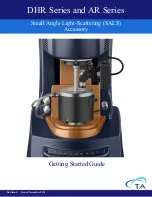
LISST-SL V2.1
User’s Guide
38
Removing Bubbles
CAUTION: Pressure Limitations
around the center sampling hole with a
plastic ring between the larger o-ring (2-
015) against the nose and the smaller
o-ring (2-012) that will seal against the
bulkhead. Be careful to maintain the o-
rings and spacer in place while
removing dirt and bubbles from the
cavity. A light coat of o-ring lubricant
will help to hold the o-rings in place
during reassembly. Submerge the nose
and SL sensor. Remove the pitot cap.
Clean the cap. Remove the 2-007 o-ring
that holds the 35um screen in the
bottom of the cap. Clean or replace the
screen. Place it underwater and remove
all bubbles from it.
Remove the bubbles from the three
radial static ports and the pitot port on
the stainless steel plate on the face of
the SL bulkhead. It is also helpful to
remove any other bubbles from the
mating pieces and threads as they may
move during reassembling. The syringe
provided can be helpful for dislodging
bubbles. Various pumping schemes can
also be used for cleaning and de-
bubbling.
The differential pressure sensor used
for the pitot static velocity
measurements is a delicate sensor.
Since we are recommending water
columns on the inlet for purging, it
should be noted that the head should
not be greater than 10 feet (3m). If
other means of water flow to the
passages are implemented, please
be careful not to exceed 5 psi.
Screw the nose onto the LISST-SL
while it is still under water. Align the
three white marks on the side. Screw
on the pitot cap. At this point all
accessible air has been removed from
the passages leading up to the
differential pressure sensor to the pitot
tube system. Some bubbles can still
reside in the solenoid of the system.
Slight pressure and activation of the
solenoid may be required to allow the
bubbles to escape.
Fill a one meter long ¼” tygon tube with
water and attach it to the pitot cap (a
short 3/8” diameter tube can be added















































